Surviving roommate in Idaho murders saw masked killer leave home after telling victims ‘I’m going to help you’
Terrifying account from one of the two students who survived the stabbing spree revealed
One of the roommates who survived the quadruple murder of four University of Idaho students came face to face with the masked killer and overheard him telling his victims “I’m going to help you” before stabbing them to death, according to newly-released court documents.
Chilling new details about the mass murder came to light on Thursday in Bryan Kohberger’s affidavit, as he appeared in court in Idaho for the first time charged with murder.
On 13 November, roommates Kaylee Goncalves, Madison Mogen, Xana Kernodle and Kernodle’s boyfriend Ethan Chapin were brutally stabbed to death in an off-campus home in Moscow, Idaho. Two other female roommates were also home at the time of the attack but were left unharmed.
Now, the documents reveal for the first time that one of those surviving roommates had a lucky escape from the killer as he walked right past her on the second floor of the home after he had just murdered four of her friends.
In her terrifying account to investigators, the roommate, identified as D.M. in the documents, revealed that she heard the killer inside the home, overhearing his chilling words to the victim.
She also revealed that at least two of the victims had realised that the assailant was inside their home prior to him launching his attack, recollecting a moment where she heard one of her roommate’s saying “there’s someone here”.
The survivor told investigators that the four victims had all come back to the King Road home from their respective nights out at around 2am and were in their rooms by around 4am – except for Kernodle who got up to collect a DoorDash order around that time.
D.M. told investigators that she had gone to sleep in her bedroom on the second floor of the three-floor home and was woken by what sounded like Goncalves playing with her dog in one of the third-floor bedrooms.
A short time later, D.M. said that she heard someone believed to be either Goncalves or Kernodle saying something to the effect of “there’s someone here”.
Minutes later, D.M. said that she looked out of her bedroom for the first time but did not see anything.
She then opened her door for a second time when she heard what she thought was crying coming from Kernodle’s room, the documents state.
At that point, she said she heard a man’s voice saying something to the effect of “it’s ok, I’m going to help you”.
When she opened her door for a third time minutes later, she said she saw “a figure clad in black clothing and a mask that covered the person’s mouth and nose walking towards her”.
As she stood in a “frozen shock phase,” she said the man – who she did not recognise – walked past her and headed toward the back sliding glass door of the home.
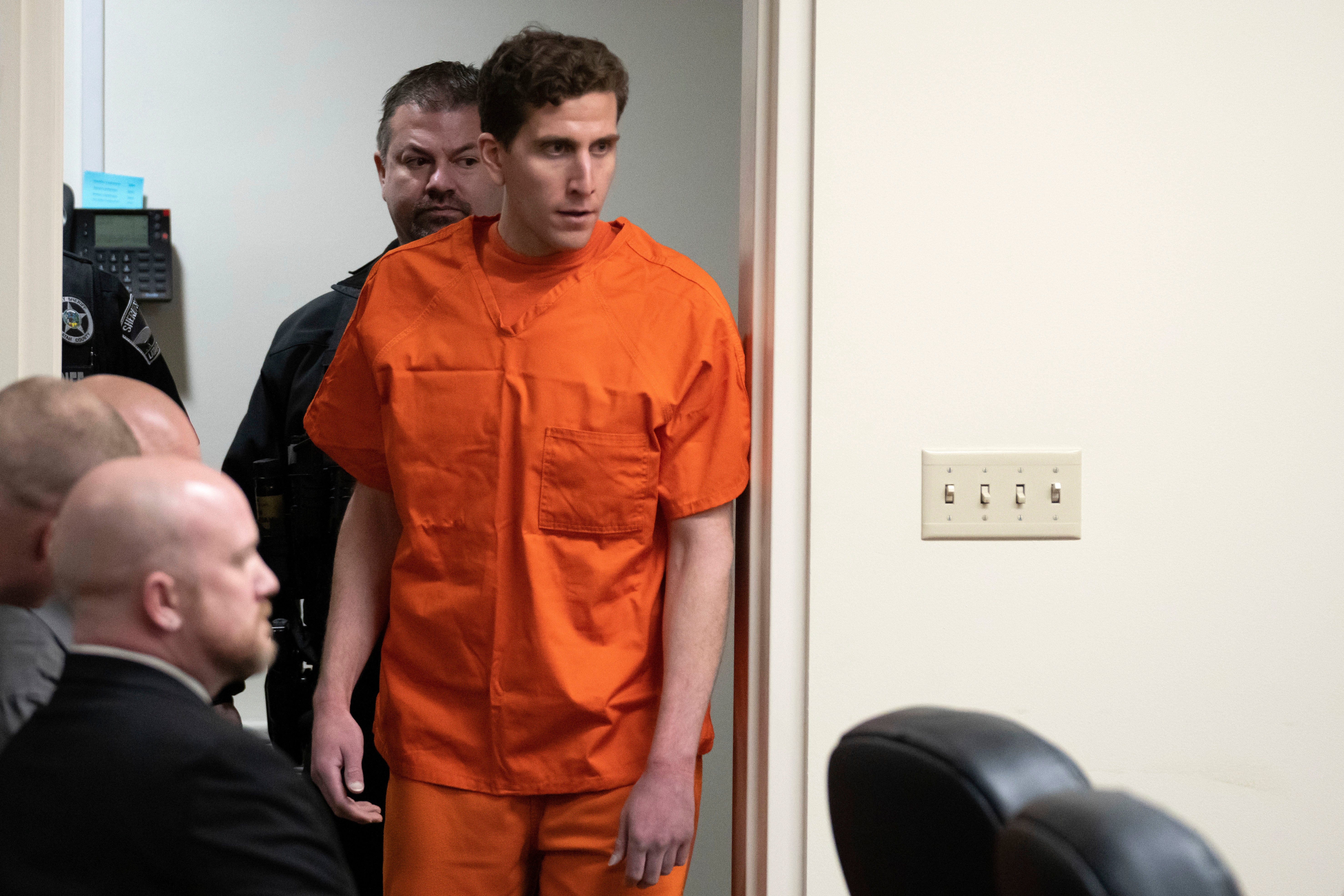
The witness said that she then locked herself in her room.
Hours later, Mogen and Goncalves were both found stabbed to death together in Mogen’s single bed in her room on the third floor.
The bodies of young couple Kernodle and Chapin were both found in Kernodle’s bedroom on the second floor of the property, with the 20-year-old woman found on the floor.
In an eerie revelation it has emerged that Goncalves’ pet dog Murphy was found unharmed in Goncalves’ bedroom, which is also on the third floor, the officer wrote.
Around the time that the roommate witnessed the suspect, a security camera near the home picked up the sound of a whimper followed by a loud thud. A dog was also heard barking numerous times starting at 4.17am, the documents state.
The documents also show what led investigators to the suspect, revealing how that the killer left a tan leather knife sheath on Mogen’s bed next to her butchered body.
Mr Kohberger’s DNA was found on the sheath which features the “Ka-Bar” “USMC” and the United States Marine Corps eagle globe and anchor insignia stamped on the outside of it,” the documents state.
“The Idaho state lab later located a single source of male DNA (suspect Profile) left on the button snap of the knife sheath.”
Investigators were able to trace the DNA evidence to Mr Kohberger by matching it to DNA found on trash recovered from his family home in Albrightsville, Pennsylvania.
Mr Kohberger was also linked to the murders through his white Hyundai Elantra and through cellphone data.
The Washington State University (WSU) student’s vehicle had been captured on surveillance footage driving from his home in Pullman, Washington state, to the King Road home around the time of the murders – and then back again, the documents state.
Investigators believe that Mr Kohberger turned his cellphone off on the night of the murders in order to try to avoid detection.
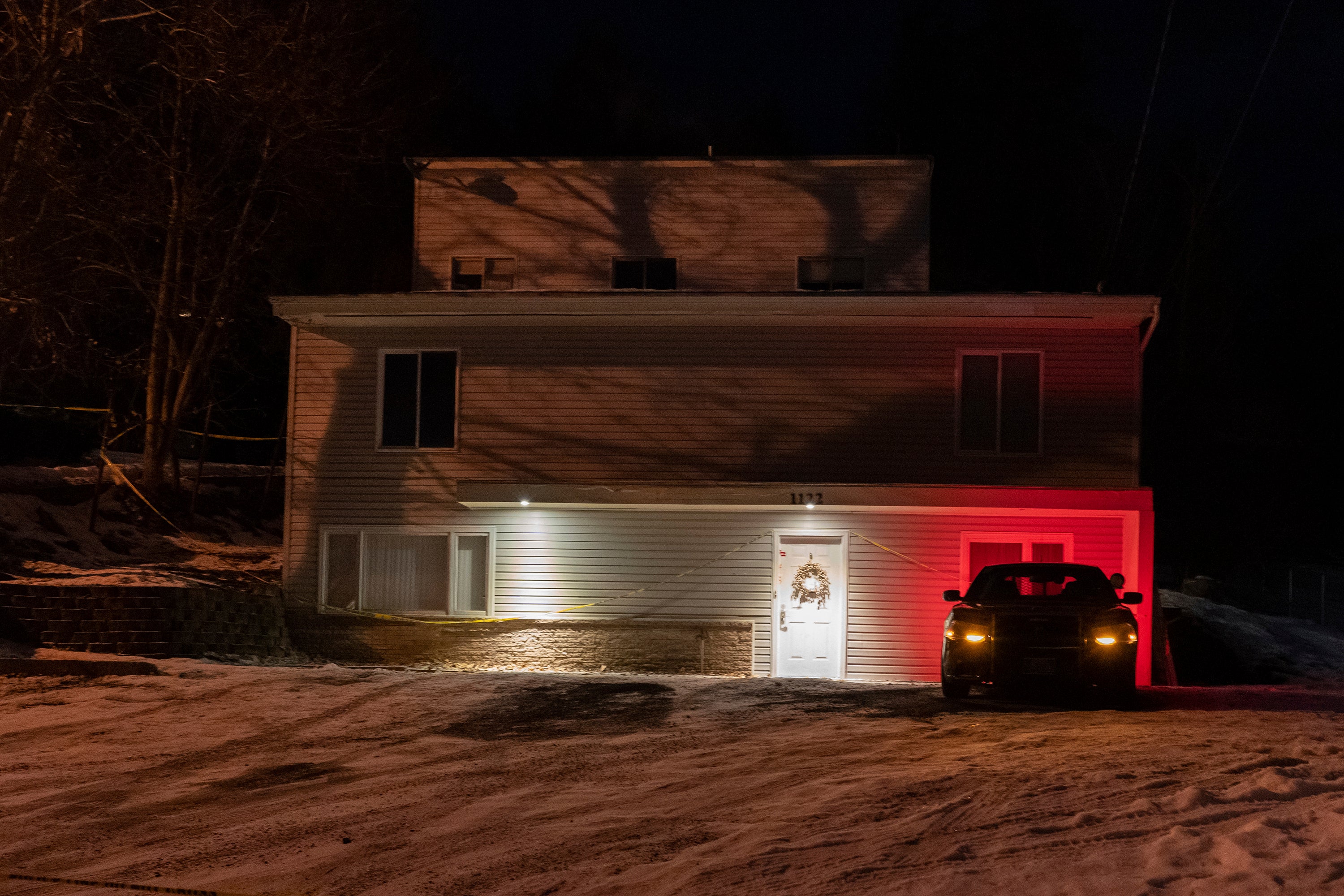
However, cellphone data places him close to the home on King Road at around 9am on 13 November – suggesting that he returned to the scene of the crime just hours after allegedly murdering the four victims at around 4am.
Prior to the 13 November massacre, investigators also believe that he stalked the victims’ home at least 12 times.
Cellphone records show that his phone pinged in the area of the King Road home on at least twelve occasions prior to the time of the murders. The exact dates of these instances were not revealed in the documents but all bar one were in the late evening or early morning hours.
One incident was identified on 21 August, when the suspect was stopped by police just minutes from the home where he allegedly knifed the four students to death three months later.
A citation from Latah County Sheriff’s Office, obtained by The Independent earlier this week, reveals that the traffic stop took place at around 11.40pm at the intersection of West Pullman Road and Farm Road in Moscow. The record shows he was stopped for failing to wear his seatbelt – just 1.7 miles and a five-minute drive from the home on King Road where the victims were murdered.
The release of the documents comes as the suspected killer appeared in court in Idaho for the first time charged with the murders of the four students.
The 28-year-old criminology PhD student was led into Latah County Courthouse just before 9.30am PT on Thursday morning for his initial appearance before the Latah County Magistrate Court judge.
He was ordered to be held without bail as the victims’ sobbing families looked on. Mr Kohberger was expressionless throughout the hearing.
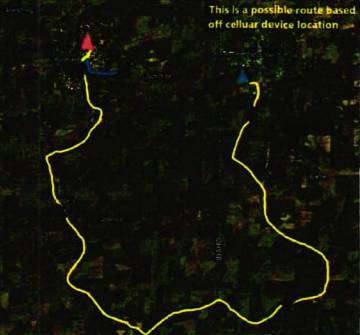
At the arraignment, he was read his rights and the charges against him and was served his arrest warrant.
He is being represented by public defender Anne Taylor – an attorney best known for securing the overturning of a murder conviction because of false statements made by Idaho police.
Mr Kohberger – who plans to fight the quadruple homicide allegations – was not asked to enter a plea at the hearing.
While the details of what led investigators to his door had been kept under wraps up until now, a source previously revealed that police deliberately pulled Mr Kohberger and his father over twice on their 2,500-mile journey from Washington to Pennsylvania so that officials could “look at his hands”.
The 28-year-old’s father had travelled to meet his son in Washington state – where he had just completed his first semester on the criminal justice graduate at Washington State University – before the pair began the drive to Pennsylvania together.
During that journey, the father and son were pulled over twice by police in Indiana on 15 December.
A law enforcement source told Fox News that police in Indiana had been asked by the FBI to pull the suspect over in his white Hyundai Elantra.
According to the source, the FBI was seeking images of the suspect’s hands as part of the investigation into the murder case.
It is not clear why images of Mr Kohberger’s hands were important to the investigation or if the officers managed to obtain anything of interest by carrying out the stops on 15 December.
Two weeks later on 30 December, the criminology student was arrested in an early-morning raid on his family home in the Pocono Mountains in Pennsylvania, where he had gone to spend the holidays. He was held in jail in Monroe County for six days before he waived his extradition rights at an extradition hearing on Tuesday and was flown from Pennsylvania to Idaho on Wednesday.
Bodycam footage from the two December stops was released this week, showing the suspect appearing startled to be pulled over by the officers in his white Hyundai Elantra – a vehicle at the centre of the murder investigation and something believed to have ultimately led to his arrest.
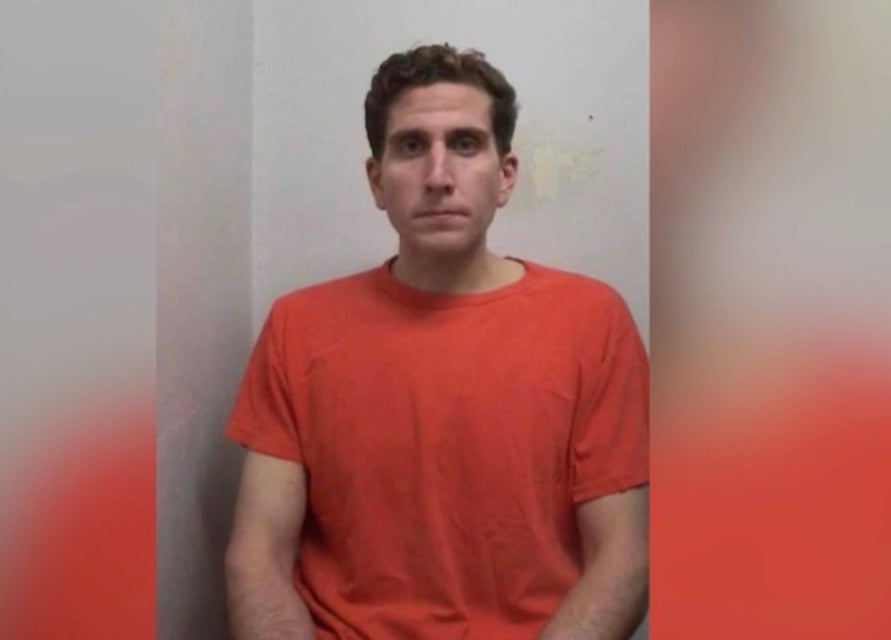
Footage from the first stop was released by the Hancock County Police Department on Wednesday, showing the Kohbergers being pulled over at about 10.44am.
In the footage, Mr Kohberger is seen in the driver’s seat and his father in the passenger seat.
The deputy tells the suspect that he was following too closely to a vehicle in front.
During the stop, Mr Kohberger and his father tell the officer about a “mass shooting” which had recently taken place at WSU. “Yeah, there was a mass shooting,” one of the men says.
Mr Kohberger then goes on to tell the deputy that he works at WSU, with his father interjecting that he is a PhD student.
One day earlier on 14 December, a man had barricaded himself in an apartment near WSU and threatened to kill his two roommates before being killed in a shootout with police.
The deputy let the Kohberger’s go without a ticket.
Minutes later, at about 10.50am, the pair were pulled over for a second time – this time by an Indiana State Police trooper.
In bodycam footage from that incident, the trooper again tells Mr Kohberger and his father that they were trailing too closely behind a truck.
The conversation is largely unintelligible due to road noise, but Mr Kohberger’s father is once again heard telling the officer that his son attends WSU and that there had been a shooting there recently.
Mr Kohberger’s concern over the shooting at his son’s college indicates his lack of awareness that his son would soon be arrested for a quadruple murder.
The father and son also tell the officer that they have just been pulled over by another trooper.
The Indiana State Trooper told Mr Kohberger and his father that he was not giving them a ticket or warning but urged them to be “giving yourself plenty of room” on the road – letting the suspect go.
Indiana State Police said that, at the time of the stop, the trooper had no information linking Mr Kohberger to the murders in Moscow.
However, according to the source, the stop was actually all part of the investigation to collect evidence on the suspect.
After days of surveillance, a team of agents swooped on the Kohberger’s Pennsylvania family home in Chestnuthill Township, Monroe County, on 30 December and arrested him for the murders.
His white Hyundai Elantra was also seized during his arrest.
Since early December, Moscow Police had been seeking the public’s help in tracking down a white Hyundai Elantra which had been spotted in the “immediate area” of the crime scene at the time of the murders.
Just five days after the murders – on 18 November – Mr Kohberger changed the licence plates on his vehicle.
Licensing records released on Wednesday show that the 28-year-old criminology student registered his vehicle in Washington state on 18 November.
Prior to this, the car had been registered by Mr Kohberger in Pennsylvania, with the plates still fitted with Pennsylvania plates when he was pulled over in the other police stop back in August.
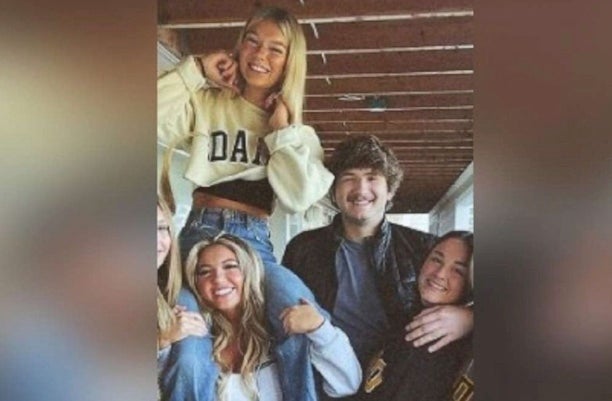
Mr Kohberger is now being held in the Latah County Jail in Moscow on four counts of first-degree murder and one burglary charge.
Officials have so far remained tightlipped about Mr Kohberger’s connections to the four victims and it remains unclear what connection he may have had to them prior to the murders.
Police sources told CNN that the Washington State University PhD student and teaching assistant was linked to the savage attack when the white Hyundai Elantra seen near the crime scene was traced back to him. His DNA was then also matched through genetic geneology techniques to DNA found at the crime scene, the sources said.
The murder weapon – a fixed-blade knife – is yet to be found.
As a criminal justice PhD student at Washington State University, he lived just 15 minutes from the victims over the Idaho-Washington border in Pullman.
He had moved there from Pennsylvania in August and has just completed his first semester.
Before this, he studied criminology at DeSales University – first as an undergraduate and then finishing his graduate studies in June 2022.
While there, he studied under renowned forensic psychologist Katherine Ramsland who interviewed the BTK serial killer and co-wrote the book Confession of a Serial Killer: The Untold Story of Dennis Rader, the BTK Killer with him.
He also carried out a research project “to understand how emotions and psychological traits influence decision-making when committing a crime”.
He reached out for participants on Reddit, with the chilling survey resurfacing in the wake of his arrest.
“In particular, this study seeks to understand the story behind your most recent criminal offense, with an emphasis on your thoughts and feelings throughout your experience,” the post said.

